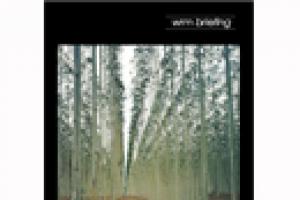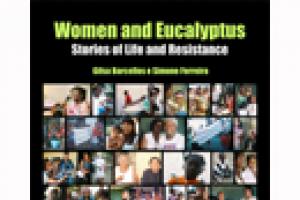In last month WRM bulletin Nº 125, and linked to the 12th Conference of the Parties to the United Nations Framework Convention on Climate Change held in Bali, Indonesia, in December 2007, we warned about some decisions of the Clean Development Mechanism (CDM) Executive Board that might attract more tree plantation projects to the CDM –such as the removal of restrictions that prevent providing a perverse incentive to cut down forests to replace them with CDM sponsored monocultures, and theincrease of the size of tree planting projects that can apply to the CDM under simplified procedures and
Large-Scale Tree Plantations
Industrial tree plantations are large-scale, intensively managed, even-aged monocultures, involving vast areas of fertile land under the control of plantation companies. Management of plantations involves the use of huge amounts of water as well as agrochemicals—which harm humans, and plants and animals in the plantations and surrounding areas.
Other information
3 January 2008
Bulletin articles
3 January 2008
In March 2006, in Curitiba, Brazil, the parties to the Convention on Biodiversity (CBD) discussed the issue of genetically modified (GM) trees. Some delegates demanded a moratorium on GM trees. Others requested that the CBD produce a report looking at the "potential environmental, cultural, and socio-economic impacts of genetically modified trees".
The CBD produced its report in early December 2007. The report will be discussed during the 13th meeting of the CBD's Subsidiary Body on Scientific, Technical and Technological Advice (SBSTTA), in February 2008 in Rome.
Publications
17 December 2007
Until now the debate over genetically modified organisms – also known as transgenic organisms – has mainly focused on agricultural crops, and only to a much lesser extent on genetically modified trees. This is understandable, given that transgenic crops such as corn and soybeans are already being commercially grown and will be directly or indirectly eaten by human beings, posing a potential threat to their health.
Transgenic Trees
Bulletin articles
5 December 2007
Being “carbon neutral” seems to have become fashionable. The World Bank, the Vatican, the World Olympics, the Football World Cup, the Body Shop, the Rolling Stones, and a long list of celebrities proclaim themselves to be totally or partially “carbon neutral”. Even Mercedes Benz recently held in California what was described as “the world’s first ever carbon neutral fashion week”! It is therefore understandable that the New Oxford American Dictionary has proclaimed "carbon neutral" as its Word of the Year for 2006.
Bulletin articles
5 December 2007
Forestry development in Chile –meaning monoculture tree plantations- is marked by a great imbalance in the distribution of the monetary wealth generated by this industry. The huge profits obtained -subsidized by the Chilean people- enable the economic groups that own these companies to generate enormous wealth, while the population does not receive in exchange any real benefits from this activity.
Bulletin articles
5 December 2007
Most Chilean forestry companies’ plantations are certified, some by FSC and the majority by CERTFOR (a member of PEFC). In round figures, FSC has certified some 350,000 hectares, while CERTFOR has certified approximately 1,600,000 hectares. Given the importance of CERTFOR in Chile, it interesting to analyze it in greater detail.
Bulletin articles
5 December 2007
The 85,000 hectares territory of Woodlark Island in Papua New Guinea’s Milne Bay Province is almost totally covered by dense lowland rainforest -- lowland dry forest on the eastern side and dense jungle on the western side --which is home to several endemic species. Woodlark Island holds unique ebony species which include dark/black, grey and grey/black varieties, - there are no other forests of this type in the world.
Bulletin articles
5 December 2007
Peter George is a farmer. Or, to be more accurate, he used to be a farmer. He bought Elangeni Farm in the cool highveld of Swaziland in the mid-1970s. He grew vegetables along with some eucalyptus and acacia trees. He drove twice a day to the local market to sell his cabbages. He had a few sheep, chickens, two cows and a half-blind sheep dog. After a few years he started a small fish farm, selling to local restaurants and hotels. He built his own house, got married and started a family.
Bulletin articles
5 December 2007
European politicians want to validate the accelerated introduction of agrofuels into the EU countries establishing supposedly sustainable criteria. However, before making full assessments, consulting with the populations involved and establishing these criteria, the obligatory objectives or percentages of agrofuels to be mixed with fossil fuels have already been fixed. The percentages are so high (5.75% until 2010 and 10% until 2020) that many analyses claim that they are impossible to attain.
Bulletin articles
5 December 2007
For many years, the pulp and paper industry has been trying to paint itself green. No challenge is too big, it seems, for one of the most polluting industries on the planet. Although paper production is a major consumer of energy and a major cause of greenhouse gas emissions, the latest challenge for the industry is to go "carbon neutral". While reducing greenhouse gas emissions may sound like something that we all welcome, this industry-dominated discussion sidesteps the fact that the pulp and paper industry is expanding rapidly, especially in the global South.
Bulletin articles
5 December 2007
In the general public perception, trees are automatically associated with environmental benefits, and there is consumer demand for “cuddly” offset tree-related projects, as opposed to the type of industrial emissions reductions that have dominated the Clean Development Mechanism (CDM) market. It is estimated that some 40% of carbon credits generated in the voluntary market comes from tree-related projects.
Publications
22 November 2007
Impacts of Eucalyptus Monocultures on Indigenous and Afrobrazilian Women in the State of Espírito Santo.
By Gilsa Barcellos and Simone Ferreira
Women and Eucalyptus. Stories of Life and Resistance
Also available in Portuguese


